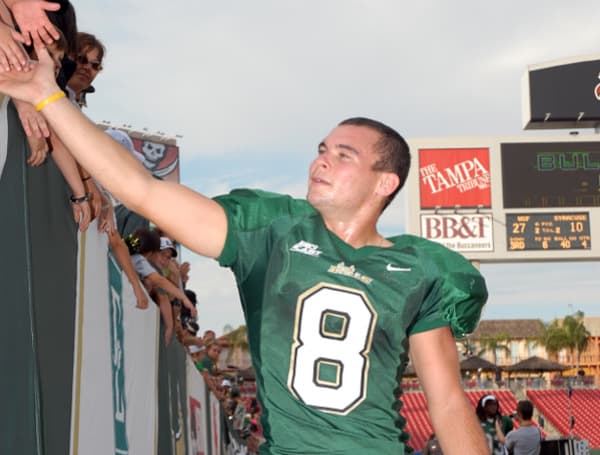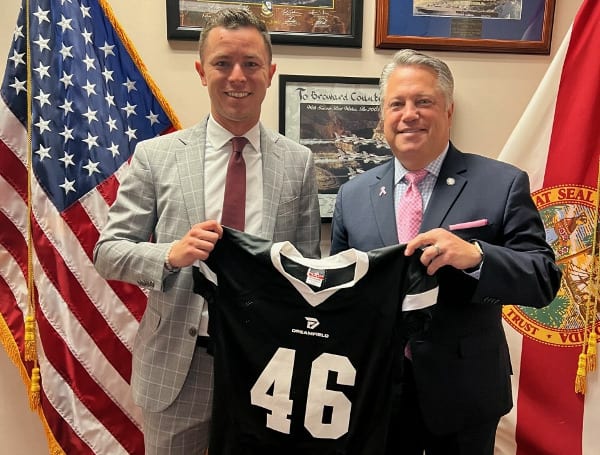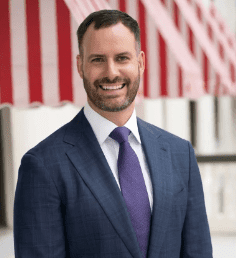TAMPA, Fla. – The passing of Florida’s name, image and likeness bill is something Corey Staniscia describes as “lifechanging.” His tireless work with state representative Chip LaMarca (R-Lighthouse Point) on authoring the bill and seeing it go into effect last July 1 is something that has been changing the lives of many student-athletes throughout the Sunshine State.
That includes the University of South Florida, from which Staniscia graduated and where he was a student manager on the football team from 2006 to 2011. Though he moved into the political arena, his fervor for sports and passion for the university never waned. Indeed, Fowler Avenue Collective is the result of his interest in politics, athletics and USF.
Launched August 5, the collective is under the umbrella of Orlando-based Dreamfield, a NIL marketplace that has former college quarterback McKenzie Milton (UCF, FSU) and D’Eriq King (Houston, Miami) among its founders. The platform is designed to unite the USF fanbase and student-athletes. Fans can donate as little as $10 or as much as $200 on a monthly basis.
“When we started to think about this model, we looked at the average fan with some disposable income,” said the 34-year-old Staniscia, director of external affairs at Dreamfield, which boasts more than 100 collectives. “They want to give back to the university, but do not have enough money to make a huge impact. But maybe the amount of money a fan can spend is $25 a month, or $250 to $500 a year.”
There are many potential affordable opportunities for engagement, such as through personal appearances that include autograph sessions and virtual meet-and-greets.
“For those who may not be able to afford to be an Iron Bull or anything like that, we want to give them an avenue to be able to tap in and make an impact right away,” said Staniscia, in referring to USF’s highest level of annual giving to the Bulls Club. “Also, they get something of value in return and see the program succeed.”
Helping make it happen are former USF football teammates Matt Grothe and Andrew Ketchel. The two roomed together during a memorable period under Jim Leavitt when a decade-old program achieved much success in the Big East. Now, the former star quarterback and tight end have been educating and supporting current Bulls on NIL possibilities through Fowler Avenue Collective.
“The collective is intended to help manage the money that is coming in and set up events,” said the 34-year-old Ketchel, who served as a policy adviser to former governor Rick Scott and has been a partner in the Tallahassee office of Capital City Consultants the past six years. “It is intended to have a recurring revenue source through subscriptions that can pay for events where student-athletes are invited and get paid a fee for being there. It is also intended to create a pot of money that can be accessed for other larger deals.”
The 35-year-old Grothe will host virtual events and otherwise be an active part of a collective that he sees as a vital piece to the success of the football program. As such, he could not wait to get on board.
“It seemed like a perfect opportunity and a perfect chance given the timing with everything going on with the school and (conference) realignment that is coming over the next few years,” he said. “It is definitely something big and something we needed. We need our alumni, and anybody who can help, to get behind it and help these kids.”
Unlike some other states that passed NIL legislation, coaches and administrators in Florida are prohibited from being involved in NIL affairs of student-athletes. It is for that reason why Scott is very comfortable with a pair of former Bulls involved with the collective, which is not affiliated with the university, athletic department, or booster clubs.
“How cool is it to have former players stepping up and leading the way in this new environment,” exclaimed Scott. “For me, the comfort level of former Bulls running that collective, and knowing that our fans and donors now have one place to jump in and support, is awesome. I am optimistic about what we will be able to do with this in the Tampa Bay community.”
Gerry Bohanon signed a deal with Dreamfield and subsequently became the collective’s first ambassador. The Bulls’ starting quarterback transferred from Baylor and arrived at USF in May.
“We fell in love with him as a person, and that was before he was named the starting quarterback,” said Staniscia. “Not only is he a great athlete, but a great person and spokesperson.”
Having a collective as a recruiting tool is a big deal. Such NIL opportunities are not only here to stay, but there is no telling the number of potential opportunities that can surface as the result of something like Fowler Avenue Collective. Though Scott and other coaches at USF cannot be involved, they have something to show prospective recruits inquiring about NIL.
“At least a coach, if asked that question by a recruit, or whoever it might be, can say that although he is not a part of it, there is a tool in place that will help you,” said Staniscia. “At least a foundation is there and it is something to show prospective student-athletes, or current athletes, that there is a mechanism here for NIL opportunities.”
Last year, Scott spent a good portion of his preseason media day talking about the new locker room and the upcoming groundbreaking for what is now a nearly-completed indoor practice facility. Shortly after the season began, he spoke about building momentum for an on-campus stadium.
Isn’t it something how quickly facilities improvements shifted from being a white-hot topic to, well, not as hot? Not that the importance of such projects has diminished. On the contrary. Rather, Scott spoke for several minutes at this year’s preseason media day about how NIL is currently driving his and other programs. What might have once been a fantasy when Grothe and Ketchel were playing, is now an unmistakable reality that will leave those not responding sufficiently far, far behind.
“The people and programs that can adjust their sails, and look at it as a potential advantage, that’s the way I am going about it,” said the third-year coach. “I am glad that we are in an area like Tampa Bay where we have a lot of businesses, a lot of resources, and a lot of alumni. I think for the very first time in college football, our fans and donors can legally have a direct impact on the level of our success. (NIL) has quickly moved up to the number one factor.”
While the desire is for as many men and women student-athletes as possible to benefit from the collective, football’s visibility and impact renders it most critical today. It comes down to recruiting and retaining, something Scott has emphasized on multiple occasions.
“This is going to start driving decisions of student-athletes and the stakes are much higher for the high-revenue sports,” said Ketchel. “We raised money for an indoor practice facility and we’re raising money for an on-campus stadium. Now, NIL hits us and we realize it is going to be as vital to our success as anything. It is constantly moving and changing and I think Jeff understands the importance of these different things and trying to retain (his players).”
Ketchel, Grothe, and Staniscia are proud alums and, in the case of Ketchel and Grothe, proud former Bulls football players as well. They want to see every student-athlete succeed in the classroom, on the field of play, and through a badly-needed collective.
“I hope to stay in touch and remain close to these kids over the next few years,” said Grothe. “Anything I can do to help them is the biggest thing to me. I want them to succeed. The (collective) is something that, as a former player, I sure as hell wish was around back then. Obviously, it wasn’t around when I was at USF. So, now, I like to help in any way possible.”
Visit Tampafp.com for Politics, Tampa Area Local News, Sports, and National Headlines. Support journalism by clicking here to our GiveSendGo or sign up for our free newsletter by clicking here.
Android Users, Click Here To Download The Free Press App And Never Miss A Story. Follow Us On Facebook Here Or Twitter Here.
Copyright 2022 The Free Press, LLC, tampafp.com. All rights reserved. This material may not be published, broadcast, rewritten, or redistributed.




